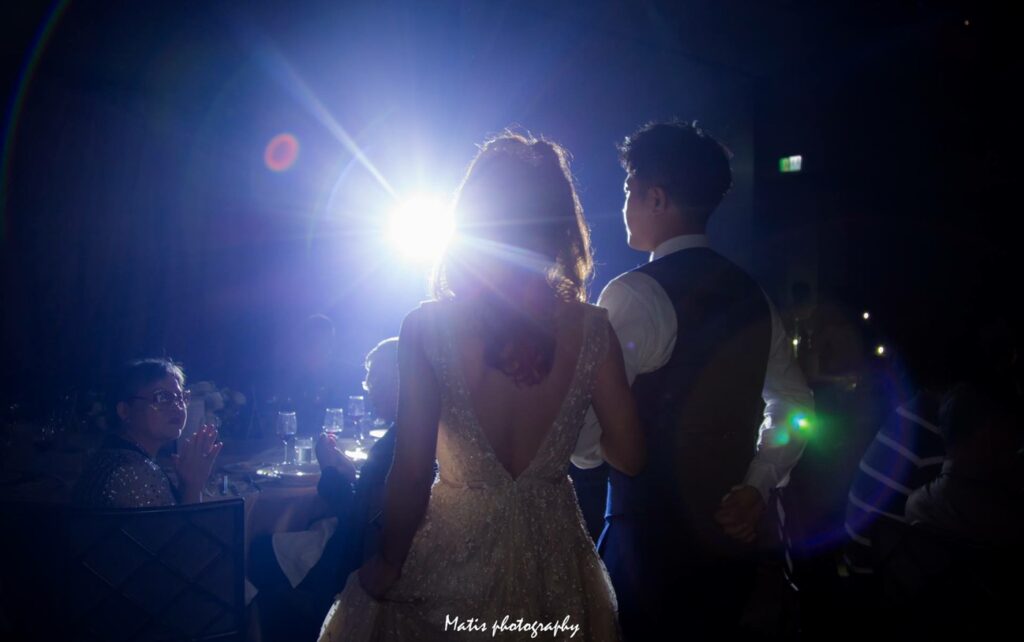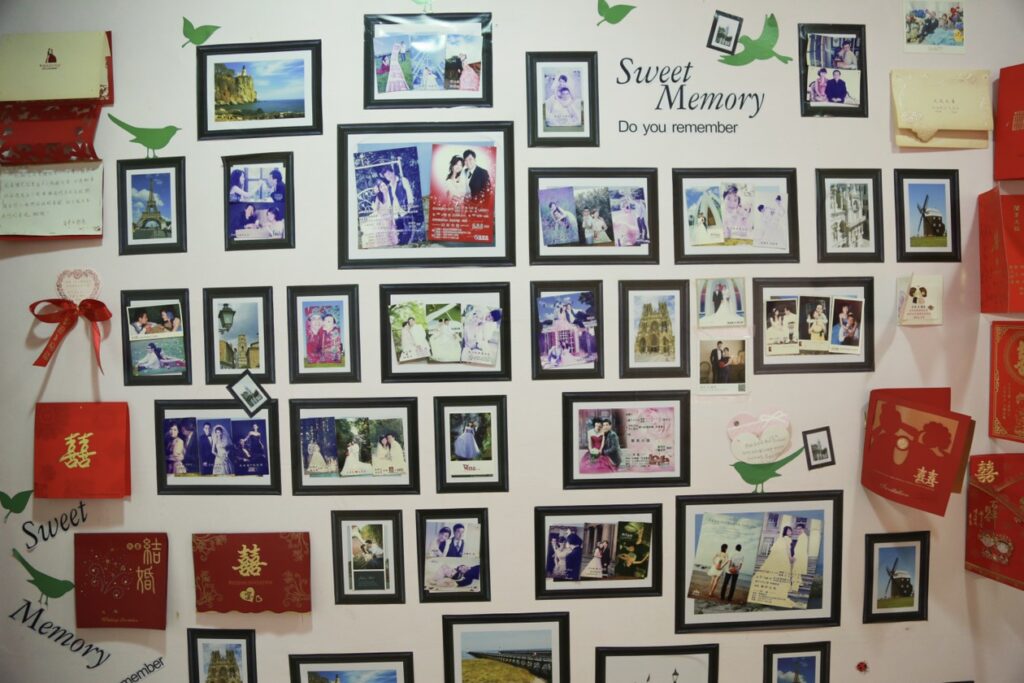Reporter / Bi-Cheng Jian, Wan-Ting Chiu, ZhuoFan Mei, Bethany Green

The search for a long-lasting relationship is a defining feature of many people’s lives. However, finding ‘the one’ can be a challenging, time-consuming and occasionally painful experience.
The prevalence of online dating apps such as eHarmony, Tinder or Bumble provides a new and instantaneous way to meet available singles from beyond a person’s day-to-day networks. Increasingly, however, narrow social circles and demanding careers have forced many young and enterprising Taiwanese singles to look for outside help to meet appropriate partners, including toward professional matchmakers.
The matchmaking profession has deep roots in Chinese society, dating back as early as the Zhou Dynasty. Although many consider the service antiquated or unnecessary, it has been experiencing a resurgence in popularity. One survey conducted by IT Bridalnetwork in 2014 found that over 70 percent of unmarried Taiwanese white-collar workers have participated in group dates organized by matchmaking services on at least one occasion.
Matchmaking may not be the first thing that comes to mind when a person considers how or where to find love. Many may even consider it old-fashioned or outdated – the term bringing to mind the stereotypical comical bumbling matchmaker in Hollywood movies. However, this antiquated art is experiencing a modern revival, providing a more personalized alternative for those who have not been successful in the dating world – online or otherwise.
Marriage and careers – millennials redefining social expectations
It’s common knowledge that over the last few decades there has been a significant change in societal and cultural expectations concerning women in the workforce. For many women who have recently graduated from university and are actively pursuing their careers, marriage and having children is no longer a top priority. This has been one of the factors contributing towards a later average age of marriage in Taiwan. According to the Directorate-General of Budget, Accounting and Statistics, Executive Yuan, the average age of marriage in 2006 for males and females was 30.7 and 27.8 respectively, rising to 32.4 and 30 in 2016.
The phenomenon of later marriage is more common among those who have received a higher level of education with research suggesting that nearly 70 percent of survey respondents with a Master degree level qualification or higher waited until after the age of 30 to get married.

For many working professionals in this era of late-marriage who hold on to their dream of a happily married life, it is becoming increasingly common to turn to a marriage agency(婚友社) for guidance – the match-makers of modern times. There are 15 physical marriage agencies in Taiwan with a reliable and trustworthy reputation. One such agency is Taipei-based matchmaking agency Super Matchmaker Mama Jan (姻緣專家詹媽媽), run by Lily Jan, or Mama Jan (詹媽媽) as she is affectionately referred to by her clients.
Super Matchmaker Mama Jan – helping working professionals find their life partner one match at a time
Mama Jan’s service accepts approximately 3,000 members each year and has helped more than 4,000 singles to find their life-long companion. However, the service doesn’t come cheap. Clients at Mama Jan’s pay NTD 35,000 for a two-year package, and an additional NTD 300 per appointment.
Mama Jan, who originally studied International Trade while at university, said that before she entered the matchmaking industry she, like many others in the community, held a negative view of those who were older and unable to find a life partner. She assumed they must have some inherent defect preventing them from consolidating a relationship. In addition, she regarded matchmaking as a vulgar way of forming a relationship. However, these opinions soon changed. Once Mama Jan started working as a joint operator of Super Matchmaker Mama Jan alongside her mother-in-law, she came to understand that the dilemma facing highly-educated singles was not any character flaw of their own, but rather the pressures and restrictions of their working environment.
Matchmaking and marriage agencies such as Mama Jan’s usually adopt a membership system. Before clients are accepted as members, the agency will carefully scrutinize their personal information and filter the applicants according to their appearance, height, academic qualification and income. The company adopts a strict selection criterion in order to ensure the best outcomes for their clients and to weed out anyone who is not a serious contender.
“People who come to our service are usually 30 to 35-year-olds who are hoping to find suitable partners for marriage,” Mama Jan said. “If an applicant’s income is not stable or their appearance is not good, they may not be accepted as a member.”
The most common strategy Mama Jan uses to set up a match is a one-on-one blind date. Members are filtered according to their characteristics and interests, and are paired with other suitable singles. Each blind date will last for approximately one hour, long enough for each person to gain a decent first impression of their matched partner.

In addition to one-on-one method, Mama Jan holds special activities such as ‘bring your pet’ dates. This type of date is designed for pet-lovers, allowing them an opportunity to bring their house pet along on the date and meet the other people and their pets.
Mr. Liao was a client of Mama Jan’s and attributes his success in love to the skill of her agency. Liao met his wife on his sixth blind date through Mama Jan’s. Both of them had high academic qualifications and had been previously unable to find a suitable partner within their narrow social circles. They hit it off, and after dating for ten months, the pair tied the knot and have been happily married ever since.
“People who come to Mama Jan want to find their spouse. They are basically ready to reach a marital agreement, so naturally the relationships formed through the agency progress relatively quickly,” Liao said.
Liao stressed that the selection method at Mama Jan’s matchmaking agency was a key reason why he chose to sign up as a member.
The relationship counselors working at Mama Jan’s filtered the characteristics and qualities of women according to his preferences and chose someone who had a similar background and interests as him. For Liao, meeting a partner through Mama Jan’s was easier than finding one by himself. He was also presented with more choices, without suffering the pressure associated with meeting people introduced by his family or friends.
VIP service is no guarantee of success
Although matchmaking agencies such as Mama Jan’s claim to have facilitated many successful matches, not everyone is convinced by the service. According to statistics published by the Taiwan Civil Affairs Bureau, there were 44 appeals for a refund from matchmaking agencies in Taiwan between January and July 2018. Many participants reflected they were not satisfied by the matches set up by these agencies, and that the dates they arranged were not very frequent or very long. As a result, couples felt they did not have adequate time to get to know each other, and therefore, could not make an informed decision about the future of the relationship. Moreover, the formal agreements between clients and the agencies often lacked clear regulations, making it difficult to claim a refund, and were accompanied by high termination costs.
No magic formula for love

Despite the successes of the service, many people continue to hold a negative impression of modern matchmakers, believing that marriages arranged in this way, using reason instead of emotion, will not stand the test of time. “Marriage and love can’t be determined by rationality alone. The essence of a relationship is determined by the heart, and our emotions are often not logical,” Chin-San Jian, owner of Columbus café and husband of 27 years, said.
People who find their spouses through matchmaking agencies, similar to those who meet online, may face difficulty once the reality of day-to-day life sinks in. The agency will set up matches according to the factual and rational similarities the couple hold in common. However, it may not adequately reflect their emotional compatibility and ability to communicate with each other in a healthy manner. If they get married soon after being matched by a professional matchmaker on the basis of interests alone, they are likely to have an increased risk of conflict and dissatisfaction when problems arise.
The biggest risk when using a matchmaking or marriage service is the couples’ inability to know each other deeply in such a short period of time. No matter how a person meets their partner, taking the time to understand each other and developing the communication skills necessary to overcome conflicts is crucial.
Undeniably, it’s a tough world out there looking for ‘the one,’ and more often than not, people are left feeling frustrated and disappointed – letting down their emotional barriers and pouring hours into apps and dating services with little to no success. Matchmaking services provide another, perhaps more personalized, option for those seeking love, and helps them to reach out beyond their own social circles. However, whether arranged by an external body or otherwise, no relationship can survive without time, intentionality and effort from both partners.



